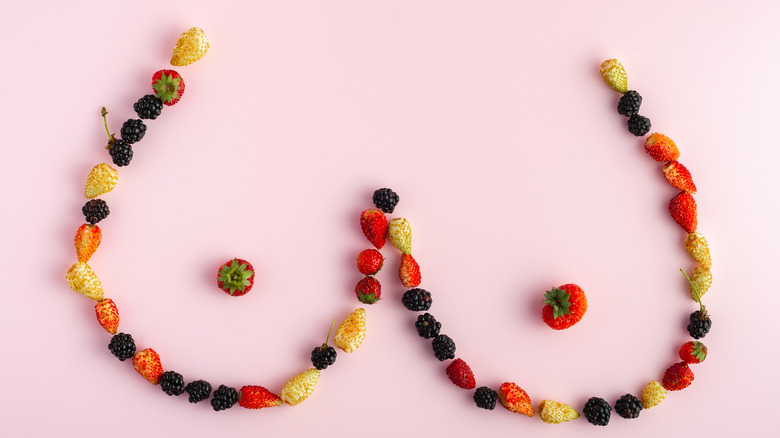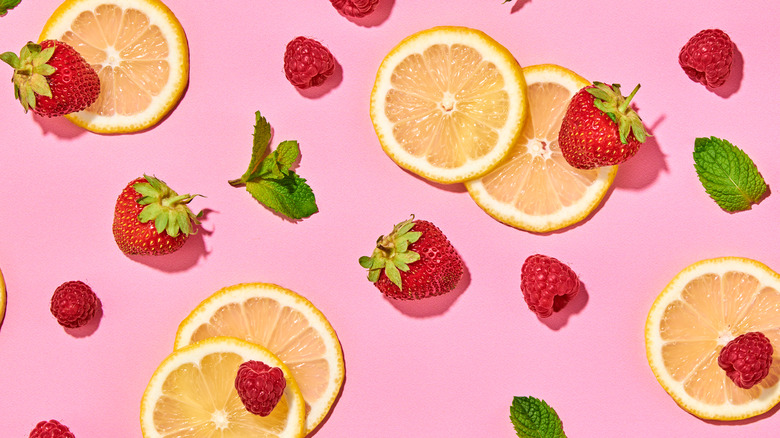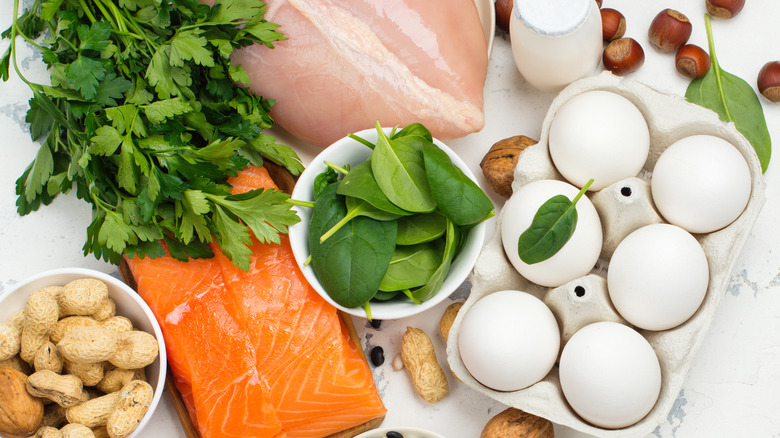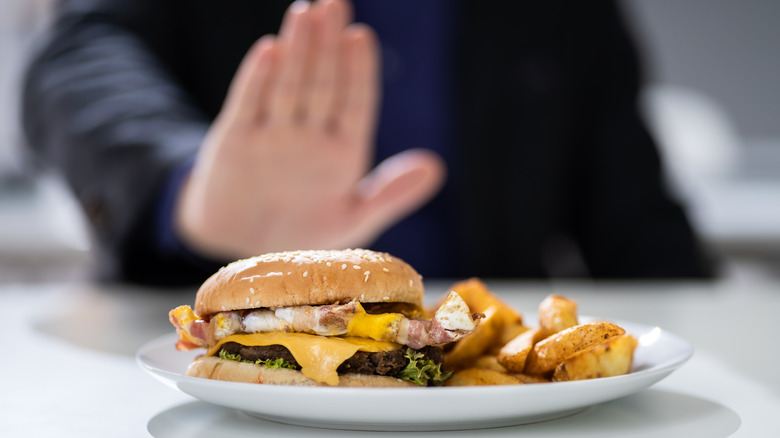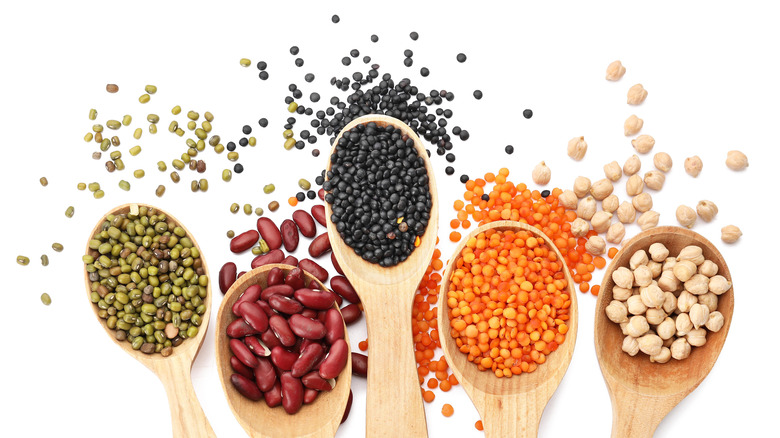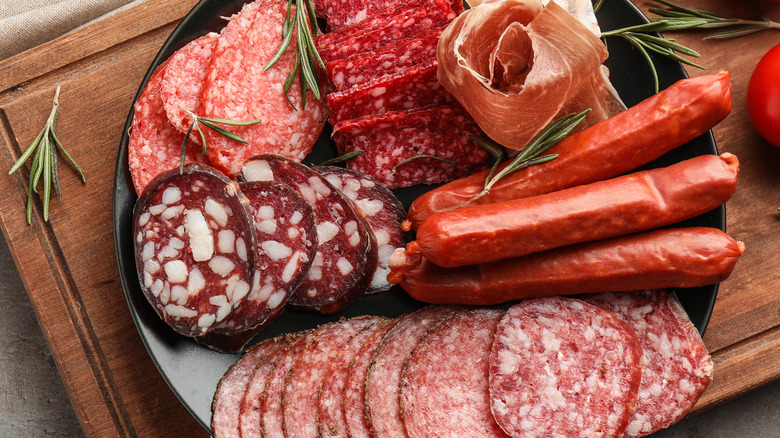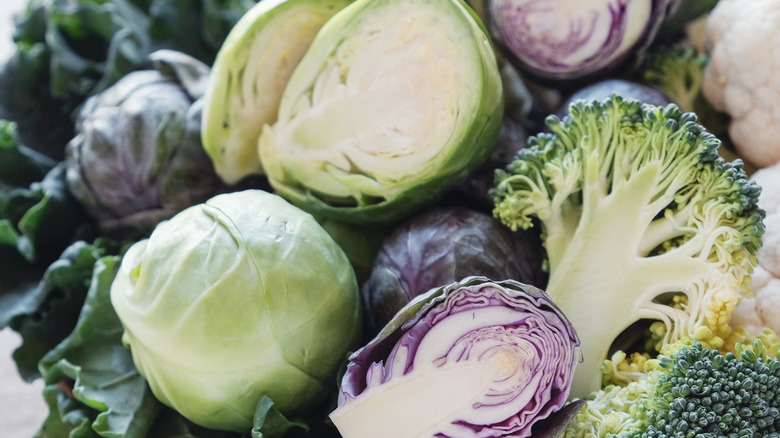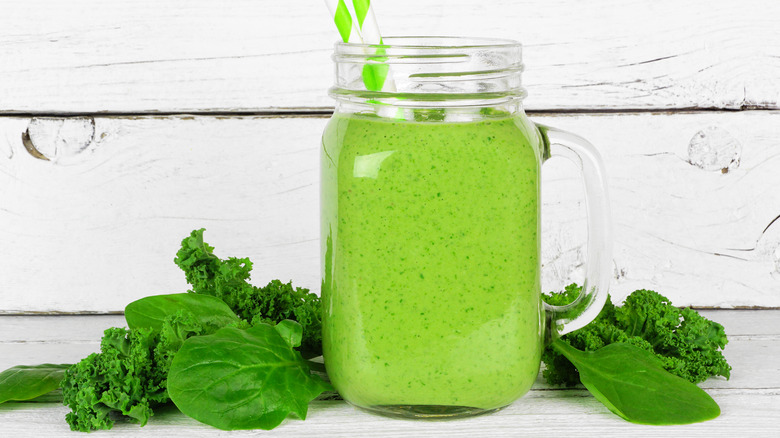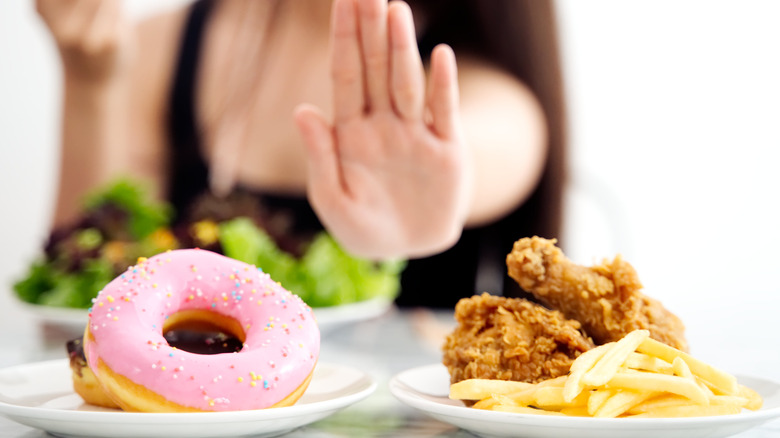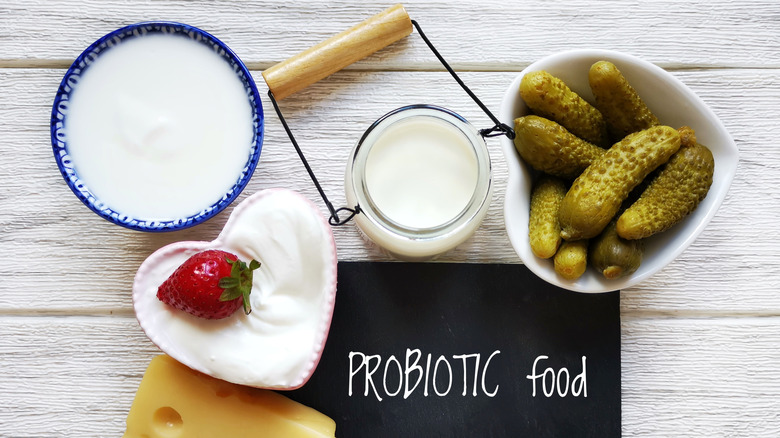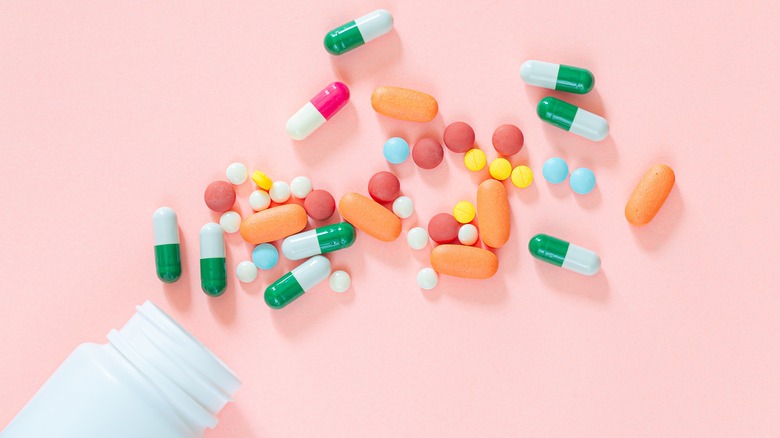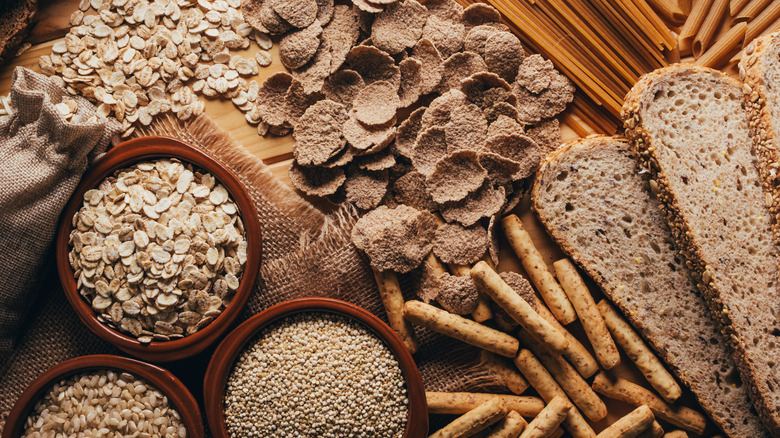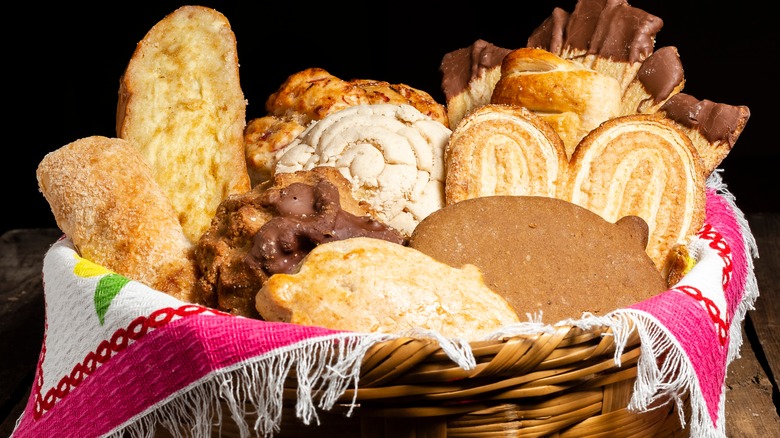7 Foods To Eat And 7 To Avoid For Breast Health
According to the National Library of Medicine, breast cancer is the most common type of cancer and the second most common cause of death in women. Yet, while breast cancer accounts for 1 in 10 new cancer diagnoses in said population, in rare cases — less than 1% — it can also be diagnosed in men, per a study published in the International Journal of Surgery Case Reports.
Like most cancers, breast cancer is a disease in which cells in different breast tissues start to grow uncontrollably, according to the Centers for Disease Control and Prevention (CDC). Breasts are made out of three main elements: lobules, ducts, and connective tissue. Still, cancer commonly develops in the lobules or ducts, the regions of the breast in charge of producing and transporting milk for breastfeeding, respectively. Nevertheless, the National Library of Medicine explains that it is common for cancerous cells to spread from the breasts to other bodily tissues. This process is known as metastasis, and it leads to reduced rates of recovery and survival.
Being such a common type of cancer, the CDC shares a series of recommendations that could help reduce the risk of the disease, including following a healthy diet. In fact, per the American Cancer Society, good nutrition can also help improve treatment outcomes and reduce unwanted side effects by replenishing the body's new and adjusted nutritional needs. Here are some common foods to eat (and some to avoid) to improve your breast health.
Eat: Berries and citrus fruits
Fruit intake is often associated with a healthier lifestyle and improved health outcomes because people who eat more fruit tend to exercise more, consume less alcohol, and are less likely to smoke (via a study published in Breast Cancer Research and Treatment). Furthermore, the benefits of eating fruit may also extend to breast health, as their antioxidant content is linked to a reduced risk of breast cancer — namely Estrogen Receptor-negative (ER-) breast cancer, a type of breast cancer that doesn't respond to hormonal therapy that's more common in women who have not gone through menopause (via the American Cancer Society).
In fact, high fruit intakes are associated with a 32% to 45% lower risk of ER- breast cancer, per a review published in the Journal of the National Cancer Institute. While these studies talk about fruit intake in general, berries and citrus fruits seem to take the lead in cancer research due to their high antioxidant content. For example, per another study, antioxidants in berries can help reduce inflammation, protect DNA, and promote the death of cancerous cells (via Antioxidants). They also reduce tumor growth by inhibiting angiogenesis, the process of creating new blood vessels which would otherwise "feed" tumors.
Similarly, per a review published in the Journal of Breast Cancer, citrus fruits may help lower breast cancer risk, because vitamin C traps harmful molecules (free radicals), regenerates other antioxidant vitamins such as vitamin E, and prevents the formation of cancer-promoting substances that attack and damage DNA.
Avoid: Alcohol
Certain types of alcoholic beverages, such as red wine, may offer some health benefits when consumed in moderation (via Livestrong). However, when it comes to fighting cancer, you're better off switching your beer or wine for a non-alcoholic drink, seeing that alcohol intake has been consistently associated with an increased risk of breast cancer, according to a review published in the American Journal of Clinical Nutrition.
The review found that women who drank 2 to 3 drinks per day had a 32% increased risk of breast cancer, and that the risk increased up to 46% in those who consumed over 3 alcoholic drinks per day compared to non-drinkers. Multiple studies have proposed two potential mechanisms behind alcohol's negative effect on breast cancer development.
On the one hand, an article published in the Journal of the National Cancer Institute explains that there's a direct link between alcohol intake and elevated sex hormone concentrations — namely, estrogen and androgen — which can promote tumor growth in Estrogen Receptor-positive (ER+) breast cancers. On the other hand, a review published in the British Journal of Cancer says that higher alcohol intakes lead to lower folate levels, a vitamin that helps reduce breast cancer risk by preventing tumor growth.
Eat: Fish, poultry, and other lean protein sources
Protein is the nutrient in charge of building all the tissues in your body. It is also needed to keep a healthy and strong immune system due to its role in producing antibodies, which the body's defense system uses to fight disease (via Healthline). Per the American Cancer Society, when you get sick, your body needs more protein in order to heal and fight the disease, including breast cancer.
According to a 2020 review in the Journal of the National Cancer Institute, research reports better breast cancer survival with higher protein intakes. Women who increased their protein intake after being diagnosed with breast cancer showed a significantly reduced risk of cancer recurrence. Furthermore, this beneficial effect was linked to both plant-based and lean animal-based proteins. However, intake of red meat — which is higher in unhealthy fats — was actually linked to a significantly increased risk of breast cancer.
When it comes to plant-based protein, soy and soy-derived products are staples in vegan and vegetarian diets. Yet, there has been some skepticism between soy intake and breast cancer risk throughout the years due to their abundance of phytoestrogen, plant compounds that act like estrogen in the body. Nevertheless, per the American Institute for Cancer Research, current evidence suggests a protective effect of soy products on breast cancer rather than a detrimental one, meaning that you can safely add tofu, soy milk, and edamame to your diet.
Avoid: Fast food
We all enjoy a good pizza or juicy burger with a side of fries now and then. However, regardless of how much we like them or how convenient they might be, it is no secret that fast foods aren't exactly the healthiest choice of all. As Medical News Today explains, fast foods are classed as energy-dense foods — meaning they have a lot of calories per serving, yet not that many nutrients — and according to research, these types of foods seem to increase the risk of cancer.
Per a 2015 study published in the journal Nutrition and Cancer, a higher frequency of fast food intake, as well as other energy-dense foods, is linked to an increased risk of breast cancer. For this reason, the World Cancer Research Fund (WCRF) and American Institute for Cancer Research (AICR) recommend limiting their consumption.
Aside from their energy density, a 2019 study published in Epidemiology and Health explains that their sodium nitrite content is another contributing factor linking processed and fast foods to cancer. Sodium nitrite is an additive used to prolong a food's shelf life. However, once your body breaks it down, it gets converted to nitrosamine, a known carcinogen (a toxic cancer-causing substance). In fact, according to the study, researchers have determined that daily fast food intake can increase the risk of breast cancer threefold.
Eat: Beans and other legumes
Legumes (also known as pulses) include beans, lentils, soy, chickpeas, peas, and peanuts. They are a food group known for being nutritional powerhouses due to their high fiber content, plant-based protein, and phytochemicals, plant compounds with beneficial health effects (via Livestrong).
In fact, thanks to their fiber and phytochemical content, a 2022 study published in Frontiers in Nutrition found that just by consuming one to two servings of legumes per week, you could lower your risk of developing breast cancer. According to the study, fiber in legumes may limit or reduce the levels of circulating estrogen in the body, reducing breast cancer risk. Similarly, a 2018 study published in Protein & Peptide Letters found that in addition to lowering estrogen levels, chickpea fiber prevented cancerous cells from surviving by inducing apoptosis, a process of programmed cell death.
Furthermore, another study published in the International Journal of Cancer determined that phytochemicals such as the antioxidant flavonol in beans and lentils had powerful anti-cancer effects associated with a reduced risk of breast cancer. According to researchers, said compounds in beans and lentils could help by scavenging free radicals, thus preventing cell and DNA damage, activating detoxification systems, promoting tumor cell death, stimulating the immune system, and inhibiting the creation of new blood vessels to "starve off" the tumors. Therefore, it wouldn't hurt to consider enjoying a side of beans, lentils, or chickpeas with your meal a couple of times a week.
Avoid: Red and cured meats
Per the World Health Organization (WHO), red meat is the muscle meat of beef, lamb, pork, veal, and goat. In contrast, cured or processed meats are the ones that have been salted, smoked, or fermented to preserve them and improve their flavor (like hot dogs, sausages, ham, and beef jerky). However, cured and red meats are classified as carcinogenic and probably carcinogenic to humans, respectively — meaning cured meats are known to cause cancer, while red meats are known to increase the risk.
According to a 2018 review published in The International Journal of Cancer, there are multiple reasons these types of meat can negatively affect breast health. First, when it comes to red meat, there seems to be an association between the residues of the hormones used in beef cattle and hormone-related breast cancer. Second, it tends to be high in saturated (unhealthy) fat and cholesterol, two compounds that strengthen the association with cancer. Third, high-temperature cooking of the meat can lead to the formation of cancer-causing compounds called heterocyclic amines (HCAs). And fourth, red meat is a rich source of heme iron, which is needed for oxygen transport throughout the body, but can also facilitate the production of cancer-causing substances (via the Harvard T.H. Chan School of Public Health).
Regarding processed meats, the high amount of additives such as nitrates and nitrites might be the link between cured meats and breast cancer, whose risk is higher in cases after menopause (but not before).
Eat: Broccoli and other cruciferous vegetables
Cruciferous vegetables — such as broccoli, cauliflower, cabbage, and Brussel sprouts, among others — are a group of vegetables known for their cancer-fighting properties (via Livestrong). Thus, it is no surprise that research has found a link between their intake and a reduced breast cancer risk. According to a study published in the journal Current Developments in Nutrition, sulfur-containing compounds called glucosinolates are behind the cancer-preventive effects of cruciferous vegetables.
The study explains that glucosinolates break down into other compounds such as isothiocyanates (ITCs), indoles, and sulforaphane, which help hamper breast cancer development by inhibiting its characteristically uncontrollable cell growth, as shown in test-tube and animal studies. In addition, the study determined that consuming broccoli and cauliflower had a stronger risk-reduction effect for breast cancer in premenopausal women. Interestingly, the effect seemed even more potent when consumed raw, seeing that heat from cooking could inactivate the enzyme responsible for breaking down glucosinolates into ITCs, or simply destroy ITCs altogether. However, that didn't seem to be the case for cabbage, which showed greater anti-cancer properties when cooked.
What's more, according to a review published in Nutrition Journal, broccoli sprouts contain even higher concentrations of sulforaphane than a fully-grown broccoli plant. This is because the compound originates in the seed, meaning that a single sprout has all of the sulforaphane of an entire broccoli. Thus, don't forget to add some broccoli sprouts along with some cauliflower or cabbage to your next salad!
Avoid: Sugary foods and drinks
Added sugars are known to contribute to numerous health problems, such as type 2 diabetes, obesity, and heart disease. Yet, according to the Centers for Disease Control and Prevention (CDC), Americans seem to be consuming around 50% more added sugars than what's recommended by the latest Dietary Guidelines for Americans, mainly in the form of candy, pastries, frozen desserts, and sugar-sweetened beverages such as soft drinks, sodas, and fruit juices.
Sadly, according to a study published in Epidemiology and Health, higher and more frequent intakes of sweets are now also associated with an increased breast cancer risk. Per a 2021 review published in Nutrients, diets high in added sugars result in weight gain, which impairs metabolic markers, increases insulin resistance and inflammation, and promotes sex hormone imbalances. This slowly leads to breast cancer development and progression. In addition, by hindering insulin metabolism, high sugar intakes also raise insulin-like growth factor (IGF) levels, which promotes tumor growth.
Furthermore, another 2021 review published in the Journal of Cancer explains that foods and drinks with high amounts of sugar lead to chronic high blood sugar levels, which has been linked to diabetes-related cancers (such as breast cancer). Lastly, the review found that some chemical compounds, such as additives used to give sodas and sweets a caramel color, might be linked to greater cancer risks. Therefore, one easy way to prevent breast cancer is to reduce your intake of sweets and sugary drinks.
Eat: Spinach, kale, and other leafy greens
Whether it is through a salad, bowl, or smoothie, adding dark green leafy vegetables such as kale, spinach, collard greens, or bok choy to your diet is a great way to boost your fiber and micronutrient intake while keeping a low calorie and fat count (per Medical News Today). In addition, they're a rich source of antioxidants and folic acid, which research suggests might reduce breast cancer risk.
For instance, per a review published in Molecules, leafy greens pack a punch of carotenoids, a group of antioxidants significantly associated with a reduced risk of premenopausal breast cancer. According to the review, carotenoids may help prevent breast cancer via multiple pathways, which include lowering inflammation, boosting immune function, fighting oxidative stress, preventing tumor spread, blocking the formation of new blood vessels, and inducing cancer cell death. In fact, per a study published in the American Journal of Clinical Nutrition, higher carotenoid intakes may lead to an 18 to 28% reduction in breast cancer risk.
Regarding folic acid, a review published in Nutrition Journal describes it as the dark green leafy vegetable vitamin, and it states that the more you consume it, the lower the risk of developing numerous cancers, including breast cancer. What's more, the review determined that women with a family history of breast cancer can reduce the risk simply by increasing their folate intake and reducing their alcohol consumption.
Avoid: Fried foods
From pastries like doughnuts, beignets, or churros to salty foods like falafel, croquettes, spring rolls, or chicken fingers, fried foods are popular menu items in numerous cuisines. Unfortunately, aside from being high in saturated fats (the unhealthy kind that increases the risk of heart disease, per Healthline), fried foods are linked to a higher risk of breast cancer, according to a study published in Epidemiology and Health. To be more precise, the study determined that women who frequently ate fried foods had a 4.5 higher risk of cancer than non-consumers.
One potential explanation, as described in a review published in the journal Food and Chemical Toxicology, is that repeatedly heating cooking oils — a common cooking practice when deep frying foods — leads to the production of multiple byproducts with well-known cancer-, tumor-, and mutation-causing properties. In fact, according to another review published in the journal Critical Reviews in Food Science and Nutrition, reheated vegetable oil has been linked not only to a higher risk of breast cancer, but also lung, colorectal, and prostate cancers as well. Nevertheless, there's no need to avoid consuming your favorite fried foods altogether. Most of them can still be prepared using an oven or air fryer, which provide the same delicious result minus the adverse health effects.
Eat: Probiotics
Probiotics are living microorganisms found in fermented foods such as yogurt, sauerkraut, kimchi, or kombucha that protect your body from infection, improve digestion, and boost your immune system (via Harvard Health Publishing). Thus, instead of causing disease, probiotics actually offer the host multiple health benefits. In fact, test-tube, animal, and human studies suggest that probiotics may also help reduce breast cancer risk, per a review published in Nutrition and Cancer.
According to the review, probiotics might help reduce tumor size, inhibit tumor growth, prevent its spread, and induce the death of cancerous cells. Furthermore, another review published in the Journal of Breast Cancer found similar results. In this case, researchers found that since the number of beneficial bacteria in the intestines declines with age (which allows harmful and even cancer-producing bacteria to thrive), intake of fermented dairy products such as yogurt or kefir might help balance or replenish the bacterial balance by providing some much-needed probiotics — namely Lactobacillus acidophilus — which, in turn, helps lower cancer risk.
Avoid: Dietary supplements
Vitamins and minerals — known as micronutrients — are naturally found in foods. Thus, eating a balanced diet should provide all the micronutrients your body needs (via the American Cancer Society). However, certain medical conditions can increase your vitamin and mineral needs, or in some cases (such as with cancer treatment), your food intake might be limited. Thus, many people turn to dietary supplements to avoid deficiencies. Nevertheless, when it comes to cancer, they can ironically end up doing more harm than good, because they can reduce the effectiveness of chemotherapy or radiation when consumed in large amounts.
According to a clinical trial published in the Journal of Clinical Oncology, cancer treatments produce reactive oxygen species (ROS), compounds with toxic effects that are meant to attack cancerous cells but can also harm healthy cells. Therefore, since antioxidants fight ROS, the trial suggests that high antioxidant intakes could reduce treatment efficacy. In fact, researchers found that the risk of cancer returning increased by 41% when antioxidants were consumed both before and after treatment. In addition, the study determined that intakes of supplements providing vitamin B12 and iron could also increase cancer recurrence and mortality risks.
Similarly, one review published in The Journal of the National Cancer Institute explains that aside from protecting healthy cells from the toxic effects of chemotherapy and radiation, large antioxidant doses provided by dietary supplements can also protect cancerous cells, thus reducing cancer survival rates.
Eat: Whole grains and other complex carbs
Complex carbohydrates are a type of carb with high fiber content and a longer and more complicated chemical structure. This means that it takes your body a long time to digest them. Thus, they have a slower impact on your blood sugar levels (via Harvard T.H. Chan School of Public Health). Aside from providing blood sugar control, evidence shows that dietary fiber is linked to a 13% reduction in breast cancer risk in postmenopausal women, per a study published in The American Journal of Clinical Nutrition.
Furthermore, according to another study published in the European Journal of Nutrition, the risk reduction of breast cancer associated with fiber intake may vary depending on the type of fiber (soluble or insoluble), menopausal status (pre- or post-menopause), and the tumor's hormone receptor status (whether they respond to sex hormones such as estrogen or progesterone).
This study determined that soluble fiber helps control insulin and insulin-like growth factor (IGF) levels, which are linked to an increased risk of breast cancer in premenopausal women. In contrast, insoluble fiber helps reduce estrogen concentrations by promoting its excretion through feces, reducing breast cancer risk in hormone-related tumors. Lastly, the study notes that by consuming foods rich in complex carbs, such as whole grains, legumes, tubers, fruits, and vegetables, you'd be increasing your intake of other plant-beneficial compounds with known cancer-fighting properties.
Avoid: White bread and other refined carbs
Simple or refined carbs are the types of carbohydrates that your body can easily absorb and, thus, can raise your blood sugar levels more quickly. This means they have a high glycemic index (GI), a measure of how fast carb-containing foods spike your blood sugar levels (per Livestrong). Unfortunately, according to a study published in the journal Cancer Epidemiology, Biomarkers & Prevention, simple carbohydrate intake and their high GI may increase the risk of breast cancer by raising insulin levels.
Per another study published in the International Journal of Cancer, having high insulin levels leads to increased insulin-like growth factors (IGFs), which increase the risk of cancer by encouraging uncontrolled cellular growth. Additionally, a review published in the journal Integrative Cancer Therapies found that because high blood sugar levels can impair the protective effects of vitamin C and damage your body's immune response, high simple carb intakes are linked to reduced survival rates for breast cancer. Thus, try switching simple carbs such as white bread, rice, pasta, and desserts for complex carbs like legumes, tubers, and whole grains.

